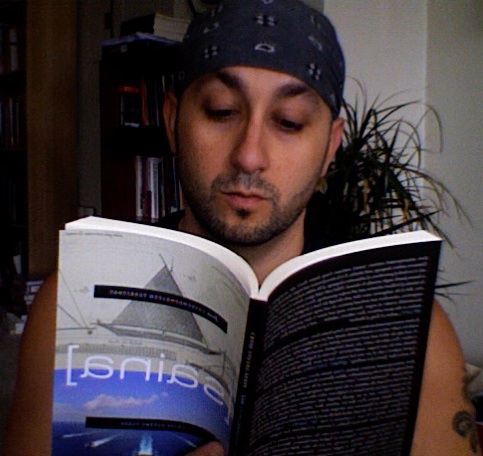Poems by Craig Santos Perez

ginen organic acts
~
“it was after my birthday
november nine teen forty one she says
“we had cake and made ice cream with an ice cream maker
we crank it
ice and canned milk and banana
my mother
makes delicious ice cream
bula hao grasia
“we are at home ilek-ña
and then we heard siren and people
telling us that the japanese are invading
so we ran up the hill and we ran
to go to the farm and
my mother
would get us all prepared
bula hao grasia
“the japanese didn’t care who they killed
but they were nice to us because
my mother
spoke japanese she even went to japan to learn how to speak
in the days before she had all us ilek-ña
bula hao grasia
— 12/8/41: on the feast of the immaculate conception sumay and agana are
bombed shortly after the us governor signs a document of surrender and guam is passed over to japanese rule
“the people are all hiding
in the caves she says
we didn’t hide in the caves
and when the soldiers came to the farm to take the food
they saw that she spoke japanese and they only took the food
bula hao grasia
~
“we lived in agana until the invasion
then we went to our land in agana heights
—agana heights : from ‘tutuhon luhan’ meaning someone who feels scared because of impending terror —
… tayuyuti ham såntan nånan yu'us …
“we all had to have a tag to wear
around our neck
what do you call that
some kind of paper that’s strong she says
“i wrote my name on mine myself
in english
bula hao grasia
“they say i look a lot like my mother
so she must be pretty good looking she jokes
“she’s about five five
green eyes just like my eyes nai
she has dark brown hair
“i don’t know what happened to my picture of her
all the pictures we had before the war
bula hao grasia
from organic acts
Mom asks: “What does ‘Saina’ mean?”
“Grandma is saina,” dad translates. We
sit, with auntie Cissy, in the living
room. They take turns reading
“Organic Acts” aloud, grandma’s voice
reflected in her daughters’ voices. “This
is your story, mom. You’re famous
now,” they joke. “Look, here’s your name.”
They continue reading. We listen:
pages turn. Suddenly, they’re silent.
Mom says: “I didn’t know they buried
the radio.” When the story
fragments, grandma sounds out letters, sparks.
Slowly, words: “qui-et,” “whis-per-ing,” “ark.”
[return to Pacific poetries feature]
Forms for an ocean
Edited by Susan M. Schultz